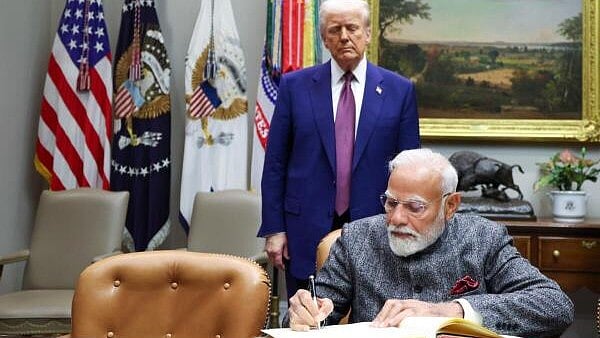
Narendra Modi during a meeting with Donald Trump
Credit: PTI Photo
Indian trade negotiators are likely to reassess their strategy in the ongoing bilateral trade agreement (BTA) talks with the US after a court halted the Donald Trump administration’s “retaliatory tariffs”, trade experts said.
“With the Trump tariffs standing on shaky legal ground, India must pause and reassess its negotiation strategy before committing to an FTA that could disproportionately favour the US interests,” said Global Trade Research Initiative (GTRI) founder Ajay Srivastava.
An official source said Indian trade negotiators are studying the implications of the US court judgment and may decide on the strategy accordingly.
India and the US have held several rounds of talks for the bilateral trade agreement, which was announced during Prime Minister Narendra Modi’s visit to Washington in February.
A high-level US delegation is scheduled to visit New Delhi on June 5-6 to take forward the negotiations. An Indian delegation led by Commerce and Industry Minister Piyush Goyal was in Washington last week for the talks.
According to sources, India had been pitching for signing of the deal before July 8, when the 90-day pause on the additional 26 per cent tariffs comes to an end.
“India is reportedly preparing to eliminate tariffs on thousands of products including automobiles, and agriculture, open its government procurement market, weaken intellectual property and data laws to benefit US tech and pharma companies, and allow more foreign market access, including approving Starlink’s satellite internet — mostly as one-sided concessions. But such a deal lacks balance and fairness,” Srivastava said.
India should resist any agreement shaped by threats or based on unlawful measures. Not only do these Trump-era tariffs violate World Trade Organisation (WTO) rules, but the US court has now confirmed that they also breach US domestic law, he added.
In early April, the Donald Trump administration imposed a 10% baseline duty on most imports and also announced country-specific tariffs on goods from 57 countries, including 26 per cent on India.